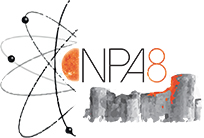Speaker
Prof.
Rene Reifarth
(Goethe University Frankfurt)
Description
Isomers are metastable states of atomic nuclei. Their half-lifes are about 100 to 1000 times longer than those of the excited nuclear states with prompt g-emissions. If the conditions in an application change on the time scale of isomers' half lifes, their abundances have to be tracked explicitly.
The high temperatures under stellar conditions enable the population of higher-lying states via thermal excitations. These states either decay back or populate different states, e.g isomers. Isomers are particular
important if their $\beta$-decay rates differ amongst each other. As a result, the effective life-time of an isotope under stellar conditions can differ dramatically from terrestrial conditions.
In stellar nucleosynthesis codes, environmental conditions change on time scales ranging from milliseconds during explosions to millions of years during the burning phases. Hence, the treatment of isomers depends on the investigated scenario.
We will present a general approach to the treatment of isomers in hot, thermalized environments with a special emphasis on the impact on stellar nucleosynthesis. Important examples like $^{26}$Al and $^{85}$Kr will be discussed.
Author
Prof.
Rene Reifarth
(Goethe University Frankfurt)
Co-authors
Mr
Benedikt Thomas
(Goethe University Frankfurt)
Mr
Deniz Kurtulgil
(Goethe University Frankfurt)
Dr
Kathrin Göbel
(Goethe University Frankfurt)

